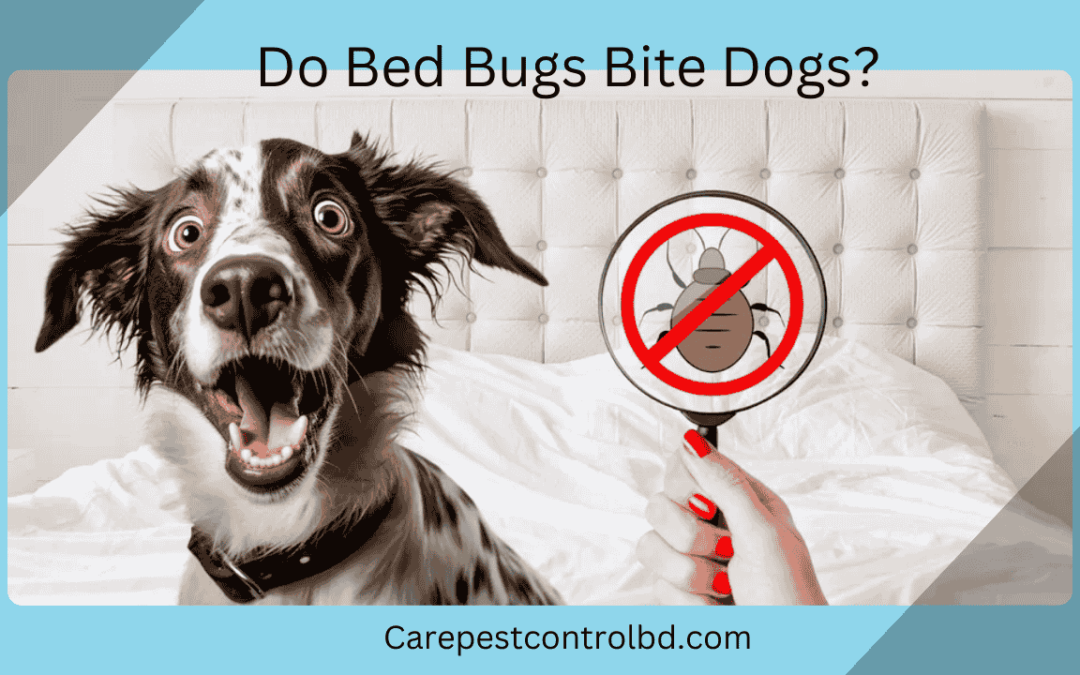Bed bugs are a nuisance for humans, but do they pose a risk to pets? Many dog owners worry about bed bugs affecting their furry companions. Let’s explore if bed bugs bite dogs, the signs to watch for, and how to protect your pets from these pests.
What Are Bed Bugs?
Bed bugs are small, reddish-brown insects that feed on blood. They are usually found in mattresses, furniture, and crevices. These pests prefer human hosts but can bite animals if necessary.
Characteristics of Bed Bugs:
- Size: About the size of an apple seed.
- Appearance: Oval-shaped and flat.
- Activity: Primarily active at night.
Do Bed Bugs Bite Dogs?
Bed bugs can bite dogs, but it’s not their first choice. They prefer human hosts due to less fur and easier access to the skin. However, in severe infestations, they might bite pets.
Signs of Bed Bug Bites on Dogs:
- Red, itchy welts on exposed skin.
- Excessive scratching or biting.
- Behavioral changes like restlessness.
- Minor blood stains on your pet’s bedding.
If you notice these symptoms, inspect your home for bed bugs.
How to Identify Bed Bugs on Dogs?
Bed bugs can hide in your dog’s fur or bedding. Use these tips to check for bed bugs:
- Inspect Your Pet’s Fur: Look for small, dark-colored bugs near the skin.
- Examine Bedding: Check for dark spots, which could be bed bug excrement.
- Look for Shed Skins: Bed bugs molt, leaving behind tiny, translucent shells.
If you suspect an infestation, act quickly.
| Symptoms | Bed Bugs on Dogs | Other Causes |
|---|---|---|
| Red welts | Yes | Yes (can also be fleas) |
| Blood stains on bedding | Yes | Rare |
| Visible bugs | Yes | No |
How to Protect Your Dog from Bed Bugs
Preventing bed bugs is crucial for your pet’s comfort. Here are practical steps to protect your dog:
Maintain a Clean Environment
- Wash your dog’s bedding weekly in hot water.
- Vacuum frequently to eliminate bed bugs and eggs.
Use Preventive Measures
- Inspect new furniture for bed bugs before bringing it home.
- Avoid letting your dog lie in infested areas.
Consult Professionals
If you spot signs of bed bugs, contact a pest control company in Dhaka. They can help you eliminate the problem effectively.
Learn more about our services.
How Can Pest Control Services Help?
Professional pest control services in Dhaka are your best ally against bed bugs. Experts use advanced treatments to target infestations.
Services Offered by Pest Control Companies:
- Heat treatments to kill bed bugs in all stages.
- Chemical solutions for stubborn infestations.
- Follow-up inspections to ensure complete removal.
Choosing a reliable pest control company protects your home and your dog from pests.
Bed Bug vs. Flea Bites on Dogs
It’s easy to confuse bed bug bites with flea bites. Understanding the differences helps in choosing the right treatment.
| Feature | Bed Bug Bites | Flea Bites |
|---|---|---|
| Bite Pattern | Linear clusters | Random |
| Activity Time | Night | Anytime |
| Visibility | Bed bugs often hide after biting | Fleas are visible on the pet |
If unsure, consult a vet for confirmation.
Why Bed Bugs May Target Dogs
Although bed bugs prefer humans, dogs can become secondary hosts. Certain conditions make pets vulnerable, such as:
- Severe infestations.
- Dogs sleeping in infested furniture.
- Proximity to areas with high bed bug activity.
If your dog sleeps on your bed, ensure it’s bug-free.
Can Bed Bugs Spread Diseases to Dogs?
Bed bugs are not known to transmit diseases. However, their bites cause discomfort and can lead to secondary infections from excessive scratching.
Steps to Treat Bed Bug Bites on Dogs
If your dog shows signs of bed bug bites, take these steps:
- Clean the Skin: Use mild soap and warm water.
- Apply Anti-Itch Cream: Use vet-recommended products.
- Consult a Veterinarian: Seek professional advice if symptoms persist.
Steps to Treat Bed Bug Bites on Dogs
If your dog shows signs of bed bug bites, take these steps:
- Clean the Skin: Use mild soap and warm water.
- Apply Anti-Itch Cream: Use vet-recommended products.
- Consult a Veterinarian: Seek professional advice if symptoms persist.
Keeping your dog’s environment clean prevents future bites.
| Step | Action |
|---|---|
| Clean the skin | Wash with soap and water |
| Anti-itch application | Use pet-safe creams |
| Professional advice | Consult a vet if necessary |
Why Choose Pest Control Services in Dhaka?
Dhaka residents face increasing pest challenges. A reliable pest control company offers:
- Quick response times.
- Pet-safe treatment options.
- Long-term solutions for pest-free homes.
While bed bugs rarely target dogs, they can bite in severe infestations. Protecting your pet involves cleanliness, vigilance, and professional help. If you’re in Dhaka, consider expert pest control services to safeguard your home and your furry friend.
ঢাকায় ছারপোকার সমস্যা?
CarePest-এর সাথে যোগাযোগ করুন। আমরা পেশাদার পদ্ধতিতে আপনার বাড়ি বা ব্যবসার স্থান থেকে ছারপোকা নির্মূল করি। আমাদের দ্রুত, নির্ভরযোগ্য, এবং সাশ্রয়ী সেবাগুলি দিয়ে আপনার স্থানটি ছারপোকামুক্ত করুন।.

